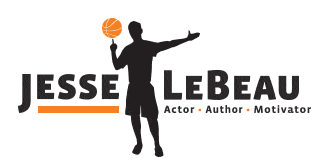“The biggest obstacle you’ll ever have to overcome is your mind. If you can overcome that, you can overcome anything.”
I have just 2 words for you guys this week: Baron Davis!
As a young kid, I used to watch BD dominate on the NBA court from my TV screen…he was a straight killer!
I’ll never forget the dunk he had during the Golden State playoff run, here it is in case you forgot. I’ll wait…
Are you kidding me?!
As a student of the game of basketball, it was awesome to be able to sit down with one of the greatest to ever do it and talk hoops, life and how the two are so closely connected.
I also got to learn what his new brand Black Santa is all about and honestly I was blown away by the full scope of what is being done with the movement.
Of course when Baron showed up to LeBus I passed him the rock and he did a finger roll from 15 feet out for a swish. When you got it, you got it I guess!
“Always do the research. Even if I never saw someone, I knew them. Do the research then you’ll be prepared and an expert.”
Baron is a good dude and was very kind to share some of the wisdom he’s gained during his impressive career with us.
To follow Baron Davis, click here.
In the full episode, you will learn:
- Why Baron considered himself an underdog
- What gave Baron an advantage on the competition
- The true meaning of “Black Santa”
- The best advice Baron would give the 14 year old version of himself
In this blog, we’ll explore key strategies for teens and parents on how to use perceived disadvantages or underdog status as fuel for success, drawing lessons from Baron’s own experiences.
Embracing the Underdog Status
The underdog narrative is powerful and often resonates deeply with those who feel they are battling against the odds. For teenagers, understanding and embracing this status can be a source of motivation rather than discouragement.
What Being an Underdog Means
Being an underdog typically means facing greater challenges and having fewer resources or recognition than others. In sports, business, and life, underdogs are those not initially expected to succeed. For teens, this could relate to academic challenges, sports, social settings, or personal goals.
Advantages of Underdog Status
- Increased Resilience: Underdogs often develop a thicker skin and a stronger resolve due to their experiences of overcoming adversity.
- Innovation and Creativity: Limited resources force underdogs to think creatively and innovate more than those who have everything readily available.
- Stronger Work Ethic: The need to work harder to prove oneself can lead to the development of a robust work ethic and determination.
- Empathy and Compassion: Experiencing struggles can make underdogs more empathetic and understanding towards others facing difficulties.
Teaching Teens to Leverage Underdog Status
Parents and mentors can help teens leverage their underdog status by:
- Encouraging a Growth Mindset: Teach teens that skills and abilities can be developed through hard work and persistence, not just innate talent.
- Setting Realistic yet Challenging Goals: Help teens set goals that stretch their abilities and encourage them to step out of their comfort zones.
- Celebrating Small Victories: Recognize and celebrate small successes along the way, which can build confidence and momentum.
- Providing Support and Resources: Offer the necessary support and resources to help them capitalize on their unique position.
Overcoming Mental Barriers
It’s crucial to address any mental barriers that might prevent teens from seeing the potential in their underdog status:
- Combat Negative Self-Talk: Teach teens to recognize and counteract negative self-talk with positive affirmations.
- Reframing Challenges: Help them view challenges as opportunities to learn and grow, rather than obstacles blocking their path.
Stories of Successful Underdogs
Learning from those who have overcome significant odds can provide teens with relatable models of resilience and determination. Here are a few examples and key lessons from well-known underdogs:
Historical and Contemporary Underdog Successes
- Sports Icons: Athletes like Michael Jordan, who was initially cut from his high school basketball team, and Tom Brady, a 199th draft pick who became one of the NFL’s greatest quarterbacks, show that early setbacks can lead to monumental success.
- Business Leaders: Figures like Oprah Winfrey, who overcame poverty and discrimination to become a media mogul, and Steve Jobs, who turned early business failures into revolutionary success with Apple, demonstrate the potential of persistence and vision.
- Cultural Figures: Authors like J.K. Rowling, who faced multiple rejections before finding success with the Harry Potter series, illustrate the power of perseverance in the arts.
Key Lessons for Teens
- Persistence Pays Off: The common thread among these stories is the relentless pursuit of goals despite setbacks.
- Believe in Your Potential: These individuals believed in their potential even when others did not, underscoring the importance of self-belief.
- Embrace Your Unique Journey: Each underdog took a unique path to success, which teaches teens that there is no one “right” way to achieve goals.
- Learn from Rejection: Instead of being discouraged by rejection or failure, these figures used it as feedback to improve and advance.
Using Stories in Everyday Parenting
- Discussion and Dialogue: Regularly discuss these stories to highlight how challenges can lead to growth and success.
- Encourage Reflective Thinking: After sharing these stories, encourage your teen to reflect on what they can learn from each example and how they might apply similar resilience in their own lives.
- Relatable Role Models: Help teens find role models who they can relate to, whether in their community, the broader public sphere, or even within the family.
Conclusion: Harnessing the Underdog Advantage with Baron Davis
In our engaging discussion with Baron Davis and through the powerful examples of successful underdogs, we’ve seen how what might initially appear as disadvantages can actually be turned into formidable strengths. From sports legends to industry leaders, the stories we’ve explored illustrate the profound impact of embracing and leveraging underdog status.
Reflecting on Baron Davis’s Insights
Baron Davis’s own journey in the NBA, where he continually defied expectations, exemplifies how embracing one’s underdog status can drive personal and professional triumphs. His approach to challenges and setbacks, with a mindset geared towards growth and resilience, provides a compelling blueprint for teens navigating their own paths.
Empowering Your Teen
As parents and mentors:
- Encourage Resilience: Continue to foster resilience in your teen, helping them to see challenges as opportunities to prove their mettle.
- Foster Self-Belief: Instill a strong belief in their abilities and potential, encouraging them to pursue their goals with tenacity and passion.
- Promote a Positive Perspective: Help them reframe their underdog status as a unique advantage, highlighting the strengths they gain from their experiences.
- Provide Consistent Support: Be there to guide, support, and cheer them on, showing that you believe in their capacity to overcome and succeed.
Final Thoughts
Baron Davis and the stories of other underdogs teach us that with the right mindset, every disadvantage can be converted into a source of strength. Let’s inspire our teens to adopt this perspective, turning their underdog status into a springboard for success.
Thank you for joining us in exploring these vital life lessons with Baron Davis. Together, let’s motivate our teens to embrace their unique paths and emerge as champions of their own incredible stories.
Hear the Podcast on Soundcloud
Have you ordered your copy of ‘Among The Giants’ yet? Get your copy by clicking !



